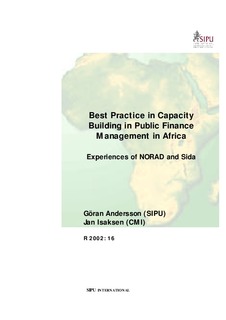| dc.description.abstract | This study was contracted by Sida and NORAD for the purpose of summarising experiences in capacity building for Public Finance Management (PFM) in Africa. In particular, the two organisations’ attempts to take a more comprehensive approach to PFM were to be highlighted. The study is a desk study, based on a review of policy documents.
An overview of the Swedish and Norwegian approach for support to PFM reveals a number of similarities between the two donors. In particular, since the seventies and eighties, their approach has moved away from the concept of “filling holes” based on standalone technical assistance to PFM institutions. Presently, the donor agencies, at least in theory, approach PFM as a system, comprising the above-mentioned components. In the diagnostic phase they attempt to take a systemic view, although most interventions focus components or sub-components.
Tentative recommendations that the authors see emergingfrom their examination of Sida and NORAD projects as well as other sources of experience are as follows:
- A long view is necessary.
- It is important to analyse the entire PFM system and to undertake interventions that are balanced between the components of PFM (Planning, budgeting, Auditing, Accounting etc.).
- Support the education and training of economists and accountants to build up a strong professional cadre of accountants and economists.
- Improve human resource management systems (like salaries and career opportunities) to attract competent personnel for PFM.
- Institutionalise the dialogue between recipient agencies and donor agencies during both diagnostic and implementation stages.
- The development perspective has to guide the development of PFM.
- Ideally, the recipient government, not the World Bank should provide leadership for support to PFM under joint donor “umbrellas”.
- Support and encourage regional organisations and networks in the PFM field.
- Consider implementation conditions such as: The level of political will to improve PFM; Degree of organisational and institutional blockages; Terms and conditions for key staff; Capacity for capacity building
- Link PRSP poverty reduction approaches, budgetary support and PFM improvement. The quality of PFM will be a decisive factors in ensuring that recipients policy decisions and agreements with donors actually lead to a greater flow of public sector resource for poverty reduction. | |
